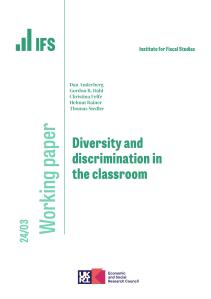Right now it’s hard to focus on anything other than political instability and the huge economic and fiscal challenges facing us. I am not sure that I have a lot more to add on those subjects. We desperately need a government that will take them seriously, provide some stability and ensure that we are on some sort of sustainable path.
Without that, little else matters. We will get poorer, perhaps much poorer. After the events of the past month that should be obvious. It is hard to imagine that there is anything I could now write that would persuade those who are not yet persuaded of that.
Sustainable and rational economic and fiscal policy, alongside effective institutions, are simply the necessary fundamental elements of good government. The minimum basic foundations on which to build. They are not, however, sufficient; they are enough to avoid chaos.
Enough. Today I want to draw attention to one of the longer-term failures of government that meant that, even in the years before the recent self-inflicted disasters, important aspects of public policy were becoming increasingly incoherent. The long-term consequences in terms of equity, living standards, wellbeing and economic success are likely to be serious. Failure to deal with this incoherence has actively undermined any ambitions towards “levelling up”. Yet this failure, and the lack of urgency in trying to address it, has received absurdly little attention.
I am speaking of the way in which we allocate funding across England to local services including the police, social care, public health, local government and schools. Let me summarise for those who do not want to read the gory details, which were laid out in a report last week by my colleagues at the Institute for Fiscal Studies. The amount that we spend on the first four of those has become increasingly random and unrelated to any measure of need. One result is that, in general, spending in areas with greater need has fallen further and faster than spending in more affluent areas.
As for schools, the effect of policy over the past decade has been to hit deprived schools, particularly in areas outside London, staggeringly hard. Between 2010 and 2020 funding per pupil in the most deprived secondary schools fell by 12 per cent but by “only” 5 per cent in the least deprived schools. In the most deprived secondary schools outside London, where results are particularly poor, spending fell by about 15 per cent. It rose in London’s most affluent schools. Did anyone actually intend this? Honestly, I don’t know.
On the upside the government has put in place a new national funding formula that creates a more rational basis for allocation in future. Doing so at a time when there is little money around is a problem, though. Anything that changes the distribution of funding leaves some worse off. It is a long time ago now but we are reaping the failure of the last Labour government, which did not make reforms when it did have the money to spend.
The government has signally failed to do anything of this sort elsewhere. Consider funding for local authorities. Some allocations to councils are still based on population characteristics in 2001, more than twenty years ago. A lot has changed since then. No data that is used in the main funding allocation formulas is less than nine years out of date.
In 2015 the government pledged a new, rational basis for funding councils, based on up-to-date data and information about needs. Buried among the surrounding chaos, the local government minister suggested last month that no such reform would occur before 2025 at the earliest, ten years after the reform process was put in place, six years after changes were supposed to have been introduced and, of course, after the next election. Political pusillanimity has won out against the urgent need for reform.
This matters enormously. For local authority services as a whole, the result has been to make funding less closely related to need; indeed less related to anything very much and therefore relatively much less generous to poorer areas than in the past. One consequence is that spending on social care for adults and children is much lower relative to need in areas with high needs than it is in areas where needs are less serious. It is not clear that anyone actually intended this. This is government failure writ large.
The same is true of spending on public health and on the police. Central government funding for these services has changed by the same percentage irrespective of changes in population or wider needs. There is now a huge divergence between the pattern of health needs and public health spending across the country.
As for the police, this has led to bigger cuts to budgets in more deprived, higher-crime areas because they are the areas that rely more on grant funding. Police funding was cut by about 20 per cent per person between 2013-14 and 2019-20 in greater London; by 13 per cent in the west midlands and 10 to 12 per cent in greater Manchester, Merseyside and South and West Yorkshire. In Surrey, Dorset and Wiltshire, by contrast, funding was cut by less than 4 per cent.
Yes, reform is hard when money is tight but it is also more important. If you do not have much money you need to spend it as effectively and efficiently as possible. Yet we are targeting the money that we do have ever less effectively.
Our governance structures make all that hard to discern. These are easy failures for central government to get away with. Disappearingly few of us have a clue how these things work and how to allocate responsibility between central and local government. Largely hidden from view, government has abrogated its responsibility. Our system of funding for local services is not fit for purpose.










